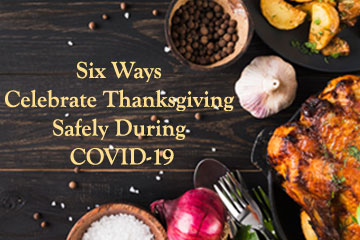
With the COVID-19 pandemic, there are no ways to eliminate risk, only ways to reduce risk. Wearing a mask, washing your hands frequently, and social distancing are the widely recommended measures to reduce risk of the spread of the disease. Everybody knows that gatherings and celebrations indoors and outdoors can increase the chances circulation of the virus. So, the question is, is it necessary to celebrate Thanksgiving? People from different regions of the country, with different risk factors, come together as a part of the celebration and this increases the risk of disease spread. Health officials say that they believe small gatherings are fueling the spread of Covid-19 in part because most homes, by design, are poorly ventilated. If you have decided to get together with family and other people to celebrate Thanksgiving, you should take certain precautions to protect yourself and others against COVID-19.
The Centers for Disease Control and Prevention (CDC) has issued guidance on celebrating Thanksgiving during the pandemic, which includes avoiding travel, large gatherings and even drinking alcohol, as alcohol can cloud judgement and increase risky behaviors.
Here are some ways to celebrate Thanksgiving during COVID-19:
- A small dinner with the people in your household: Celebrate Thanksgiving with people who you stay with. Prepare the traditional dishes and have them with your family.
- Deliver food to your neighbor: You can prepare and share traditional treats for neighbors and family members who don’t live with you. If there are people with higher risk of severe illness from COVID-19, share food in a way that doesn’t involve contact, like dropping a pie at their door. Interacting with people, especially on festive occasions like Thanksgiving, is important to well-being and to maintain healthy social connections. Sharing food is a great way to do this.
Don’t forget to follow safe practices when preparing and handling food. Best practices recommended by the World Health Organization (WHO):
- Wash your hands with soap or hand wash first.
- Wash fruits and vegetables thoroughly and with extra care if you intend to eat them raw.
- Separate poultry, raw meat, and seafood from other components.
- Wash cutting boards, utensils, countertops, and dishes before and after use with warm and soapy water.
- Cook food to recommended temperature.
- Do not cough or sneeze on food packaging.
- If you are feeling sick, do not handle or prepare food for others.
- Make sure you have washed your hands and wear a mask and maintain social distance while delivering foods to others.
- Dine virtually: This is the safest option to connect with your family and friends, as traveling is risky this year. Organize and schedule a dinner party with them through Skype, or Zoom, or any other app. You can initiate the same traditions virtually as you would in person, like asking everyone what they are grateful for or to share their favorite memory of the year so far.
- Organize a Thanksgiving picnic in your backyard: According to CDC, being outdoors reduces the risk of exposure to COVID-19. Fall foliage would also make a wonderful backdrop to your Thanksgiving celebration. CDC suggests hosting an outdoor meal with a small group of family and friends who live in your community. Always remember to keep gatherings safe by being mindful.
- Consider virtual volunteer opportunities: Consider donating to a food bank, signing up with organizations that deliver meals to seniors, or volunteering to shop for groceries for people who need help. There are many virtually volunteering options like StoriiTime, CHD Living’s, etc.
- Visit your favorite fall farm: You can visit pumpkin patches or orchards. Remember to wear a mask, maintain social distancing, and carry a hand sanitizer while visiting the farm.
The pandemic is forcing us to avoid celebrations and gatherings, and doing so is necessary for your well-being and that of your family and friends. Still, there are many ways to strengthen and renew relationships and enjoy and celebrate Thanksgiving without putting yourself and others at risk.